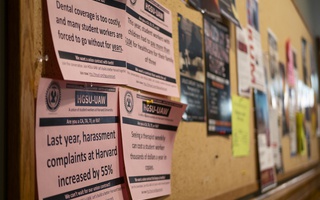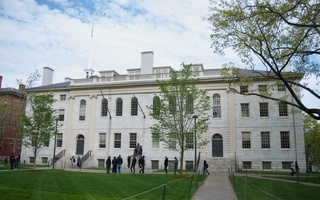{shortcode-a6074853927993a0bd5b4205745aaecdca97da4d}
Student workers across the University cast the first ballots Tuesday in a historic vote to decide whether Harvard Graduate Students Union-United Automobile Workers' bargaining committee could call for a strike if it sees fit.
Polls for the multi-day strike authorization vote will be open at least until Friday, according to an email from HGSU's bargaining committee to its members. In the meantime, negotiators from Harvard and the union will convene for their 24th bargaining session Thursday.
HGSU — which represents graduate research assistants and student teaching fellows at the University — needs to receive a two-thirds majority of voting members in favor of the strike to be granted the authority to initiate a strike.
Union organizers staffed 11 polling stations across the University's Cambridge and Longwood campuses Tuesday. Polling is set to occur at 10 other locations through the rest of the week.
After casting his ballot in the Science Center Tuesday morning, HGSU bargaining committee member Cory W. McCartan said he believes it is “pretty clear” that the authorization will achieve the two-thirds majority it needs to pass.
McCartan said he hopes for a “strong vote” in support, which will make a strike as “unlikely as possible” because it will send a clear message to Harvard administrators.
“Looking back at all the proposals Harvard has made at the table, and the proposals we've made at the table, it's pretty clear they're not bargaining in good faith at all,” McCartan said. “So it's going to take something to sort of shock them out of that and I think this is the way to do that.”
University spokesperson Jonathan L. Swain referred to previous emailed statements Tuesday that said it is Harvard's position that the strike vote is “unwarranted.”
“The University continues to approach these negotiations in good faith,” Swain has previously written.
A strike, however, will not necessarily be imminent if HGSU's bargaining committee is given the power to call for one.
McCartan said the union will do all it can to avoid a strike, and that he is “hopeful” that the University would respond in negotiations.
“If the strike's authorized, which we expect it will be, we're going to give Harvard as much time as possible to to respond to that,” he said. “I think that the way they've reacted so far demonstrates that they're aware of the gravity of the situation.”
Biological and Biomedical Sciences student Tristan Tay said he voted in support of the authorization to give colleagues in other departments “the option” to call a strike if necessary.
If a strike were called for, however, Tay said he would not participate because he cannot afford interruptions to his research.
“If I strike, I'm really only hurting myself,” Tay said. “Even though I'm not willing to strike personally, I'm still willing to authorize the strike, so that those people who want to can, and so that the union will have more bargaining power.”
Jenna M. Kaufmann, a graduate student in the Math department, said she was initially unsure about the strike authorization vote, but after speaking with other union members, decided to affirm it.
“I hope it won't come to that,” she said. “I do think that it's good for the union to have more leverage in its negotiations.”
Kaufmann added that she trusts the bargaining committee to use the threat of a strike “intelligently” to further its goals for the new contract.
Canaan R. Morse — an East Asian Languages and Civilizations graduate student who voted “yes” to the strike vote — said that though it would be “very, very painful” economically to go on strike, he would still do it if the bargaining committee calls for one.
“Sometimes reasonable people are forced to do things that they don't want to do,” Morse said.
Voting eligibility in the strike vote is relatively wide compared to those who were allowed to vote in the initial unionization election. In addition to student workers currently in the union's bargaining unit, students employed by the University last year or who expect to be employed by the University for research or teaching because of their degree programs are also eligible to vote.
McCartan said the bargaining committee will make a determination after voting closes for the day on Friday whether to extend the vote additional days to allow more people to cast ballots.
“The Bargaining Committee is going to sort of evaluate how things are going and make sure ... that everyone had a chance to vote,” he said.
The University and the union — now entering their second year of contract negotiations — have reached eight tentative contract agreements, but remain at loggerheads over several contentious topics. Sexual misconduct and discrimination grievance procedure proposals remain unresolved, as do those regarding economic issues – such as compensation and healthcare.
—Staff writer James S. Bikales can be reached at james.bikales@thecrimson.com. Follow him on Twitter @jamepdx.
—Staff writer Ruoqi Zhang can be reached at ruoqi.zhang@thecrimson.com. Follow him on Twitter @RuoqiZhang3.
Read more in University News
Prevalence of Sexual Misconduct at Harvard Remains Unchanged From Four Years Ago, AAU Survey FindsRecommended Articles
-
 Harvard Graduate Union to Hold Strike Authorization Vote
Harvard Graduate Union to Hold Strike Authorization Vote -
 Harvard Advises Faculty to Prepare after Union Moves to Vote for Strike Authorization
Harvard Advises Faculty to Prepare after Union Moves to Vote for Strike Authorization -
 As Grad Union Vows to Authorize Strike, Organizers Rally for Support
As Grad Union Vows to Authorize Strike, Organizers Rally for Support -
 Harvard Grad Students to Begin Voting on Strike Authorization
Harvard Grad Students to Begin Voting on Strike Authorization -
 UC Supports Grad Union Strike Authorization Vote
UC Supports Grad Union Strike Authorization Vote













